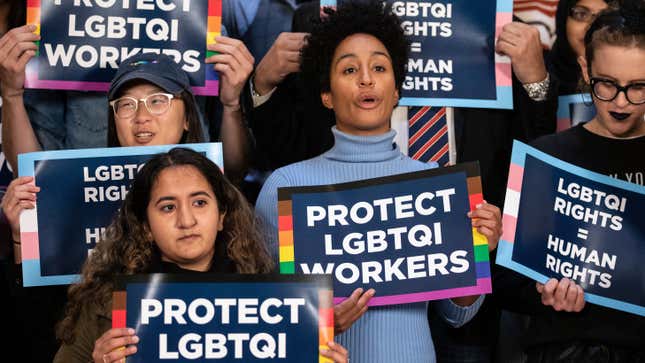Jesus-Loving Bigots Are Having a Meltdown Over SCOTUS's Embrace of Trans Civil Rights
Politics

On Monday, the Supreme Court issued a momentous ruling that extended protections from the 1964 Civil Rights Act to LGBTQ workers, barring their employers from discriminating against them on the basis of their sexual orientation or gender identity. In the majority opinion, Neil Gorsuch wrote, “Today, we must decide whether an employer can fire someone simply for being homosexual or transgender. The answer is clear.” And it is a big fat nope!
Naturally, conservative Christians are having a very predictable meltdown over the 6-3 ruling, fretting not only about losing their “religious freedom,” aka their right to be discriminatory bigots, but also about the extension of federal civil rights protections to trans workers, which they are now worrying will lead to a further expansion of trans rights.
“No question it is going to make it harder to defend our religious freedom, as far as an organization being able to hire people of like mind,” Franklin Graham told the New York Times. “I find this to be a very sad day. I don’t know how this is going to protect us.” (As NPR’s Nina Totenberg noted, however, those concerns are perhaps overblown, given that Gorsuch, in writing for the majority, “point[ed] to the 1993 Religious Freedom Restoration Act as a ‘super statute’ that may offer a potential lifeline to employers who object, on religious grounds, to hiring gay and trans individuals.”) Tony Perkins, the head of the Family Research Council, parroted similar claims about the “grave threat to religious liberty” that the SCOTUS decision represents. And in a blog post on the Family Research Council website, he made clear what exactly he perceives the threat to be: the directive to treat trans people with a bare modicum of human decency.
“In redefining the term that describes biological sex, the Supreme Court took the question of protected categories out of the hands of the American people and once again created judicial legislation,” Perkins wrote. He repeatedly misgendered Aimee Stephens, the plaintiff in the Supreme Court case, and added: “The court’s insistence that a Christian funeral home must retain a man who was hired to assist and comfort grieving families even though he decided after six years to show up in women’s clothing, threatens its freedom to operate according to its understanding of sexuality that is rooted in the facts of science and human history.”
It’s clear that religious conservatives see the Supreme Court ruling as a blow to their culture war against trans people, echoing Samuel Alito in his dissent, who also wrote of the “potential consequences” of the Supreme Court decision, which in his mind certainly seem to center around the expansion of trans rights. “Redefining ‘sex’ to mean ‘gender identity’ creates chaos,” the Alliance Defending Freedom warned, adding that “it undermines dignity, privacy, and equal opportunities for women” and that, horror of horrors, “it could compel professionals from all walks of life to refer to colleagues with pronouns and other sex-specific terms according to gender identity rather than biology.”
In their response to Monday’s ruling, the Family Policy Alliance tied the ruling to the legal efforts to prevent trans girls from competing in girls sports, which, as Ed Week noted, is seen as the next legal frontier for trans civil rights cases.
As the Family Policy Alliance wrote on its website, they see the SCOTUS ruling as marking a “pivotal cultural moment,” describing it as “one we cannot afford to lose.” “Males should not be able to steal opportunities reserved for females—including athletic opportunities,” the group continued, adding, “[W]e must fight to ensure the true meaning of ‘sex’ is maintained. If a ruling like today’s were imposed on Title IX, males would be allowed to take opportunities reserved for females—eradicating women’s opportunities across the nation.”
But as the ACLU’s Chase Strangio told Ed Week of Title IX, the federal law that bars discrimination in educational institutions that receive federal funding, “It’s going to be really hard for lower courts to explain why this Supreme Court decision means something different for Title IX.”